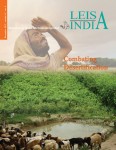/topics/society-culture-religion-and-history
Society, Culture, Religion and History
Sukhi Jeevana - Living with Wisdom, Residential retreat organized by Janapada Seva Trust, Suvidya and Arivu Educational and Cultural Trust at Melukote, Karnataka, February 15-17, 2013
Posted on 29 Jan, 2013 06:49 PMVenue
Hosa Jeevana Dari Farm, Melukote, Karnataka
Melukote is around 70km from Mysore and around 140km from Bangalore. Hosa Jeevana Daari centre is 7 Kms away from Melkote. Situated in a serene atmosphere on the Melkote – Chinakuruli road with 25 acres of land. Once at Melukote, you may take an auto to reach the farm.
Organizers
The Global Development Network announces the Global Development Awards and Medals Competition, 2012 - Apply by March 11, 2013
Posted on 29 Jan, 2013 10:05 AM About Global Development Network
About Global Development Network
Global Development Network (GDN) is an International Organization that supports research in economics and social sciences in developing countries, and connects researchers and development research institutes globally. Founded in 1999, GDN is headquartered in New Delhi, with offices in Cairo and Washington D.C.
The Global Development Awards and Medals Competition
The Global Development Awards and Medals Competition is an innovative award scheme launched by GDN with generous support from the Ministry of Finance, Government of Japan, and other donors. Since its inception in 2000, GDN has provided US$ 3.6 million in research and travel grants to finalists and winners. Winners are chosen by an eminent jury at 14th GDN’s Global Development Conference; an event attended by over 500 practitioners in the field of development to whom the finalists present their proposals/papers.
Competition categories
The competition accepts submissions in three categories:
Category 1: Japanese Award for Most Innovative Development Project (MIDP)
MIDP is a competitive grant program that provides development practitioners with the opportunity to compete for grants worth US$ 45,000 to help scale up their innovative project*. The grants are awarded to projects and/or non-governmental organizations that are supporting improved service delivery, in particular, innovative approaches and meet certain set criteria.
First Prize: US$ 30,000; Second Prize: US$ 10,000; Third Prize: US$ 5,000
Moving from paddy and sugarcane to less water-intensive crops such as oilseeds, pulses and millets can help resolve the Cauvery water dispute
Posted on 14 Jan, 2013 12:10 AMWhat happens when two or more states are dependent on same water resource for agricultural purposes ? Do the states compete for the resource or are their needs sufficiently different from each other? What are the consequences of the competition for this precious resource?
This article sheds light on the dispute between Karnataka and Tamil Nadu, for sharing Cauvery river water. The ongoing tussle between the two states has seen a lot of unrest amongst farmers in form of dharnas, protests, rail roko and non-cooperation by citizens, and disagreement with the agreements made by their respective governments and unending negotiations by governments involved, to come to a mutually agreeable decision.
Drought mitigation measures through climate adaptation for securing agricultural livelihoods in Uttar Pradesh
Posted on 13 Jan, 2013 02:43 PMProlonged and recurrent drought, being experienced in India and various parts of south Asia, is the manifestation of climate change, partly caused by human interventions. Drought has been one of the primary reasons for widespread poverty and environmental degradation including deteriorating water quality and water security. The world has been more drought-prone during the past 25 years and the vulnerability of tropical countries to drought is likely to increase (Inter-governmental Panel on Climate Change, 2007).
AnRak Aluminium in Visakhapatnam, Andhra Pradesh: Another Vedanta in the making ? – An article in EPW
Posted on 10 Jan, 2013 10:35 PMThis paper in Economic and Political Weekly (EPW) by Patrik Oskarsson deals with the bauxite (aluminium) project which is very similar to the Vedanta project in Odisha and is coming up in Visakhapatnam district of Andhra Pradesh.
AnRak Aluminium, a company of the government of Rasal-Khaimah of the United Arab Emirates and Penna Cement of AP has secured approval for both an aluminium complex and the bauxite mines, but the final forest clearance for the mines is awaited.
The AnRak project has replicated the Vedanta model of first building the refinery and then setting up the mine. The mine is to be operated by the state government to circumvent the ban on non-tribal landownership.
Forced displacement: A gendered analysis of the Tehri dam project, Uttarakhand - An article in EPW
Posted on 10 Jan, 2013 08:18 PMThis paper by Vandana Asthana in the Economic and Political Weekly (EPW) examines the lived experiences of displaced women based on the empirical findings of research that looks at women displaced by the construction of the Tehri Dam and their relocation elsewhere.
On the Sabarmati riverfront: Urban planning as totalitarian governance in Ahmedabad, Gujarat – An article in EPW
Posted on 10 Jan, 2013 07:05 PMEffect of drinking arsenic-contaminated water in children- Article in Indian Journal of Public Health
Posted on 09 Jan, 2013 10:44 PMThis paper in Indian Journal of Public Health sheds light on the specific impact of arsenic on health of children based on the review of literature on the subject. The effects of chronic arsenic toxicity under the following aspects:
- Psychological
- Skin abnormalities
- Lung diseases
- Defect in intellectual function
- Genetic issues
INTACH - Delhi chapter invites applications for a three-month Research Fellowship focussing on traditional building skills in cultural heritage conservation - Apply by January 31, 2013
Posted on 08 Jan, 2013 08:58 PMFellowship offered by
The Fellowship
The INTACH (Delhi chapter) Fellowship is established on 19 November 2012 to mark the 'Heritage Week' celebrations at INTACH. A three-month research fellowship will be offered on an annual basis by the Centre for Conservation Training and Capacity Building located at INTACH headquarters in New Delhi. This Fellowship is being established by the Delhi chapter of INTACH to support the activities of the centre in the Delhi NCR region.






